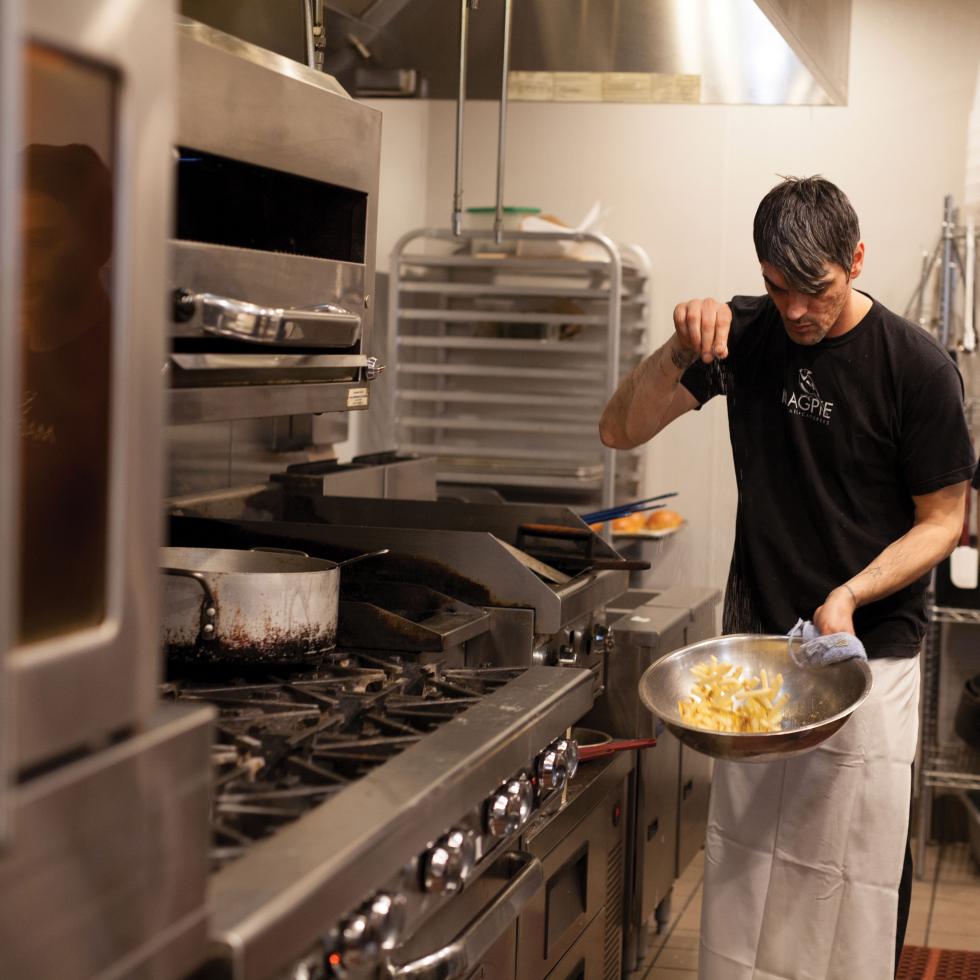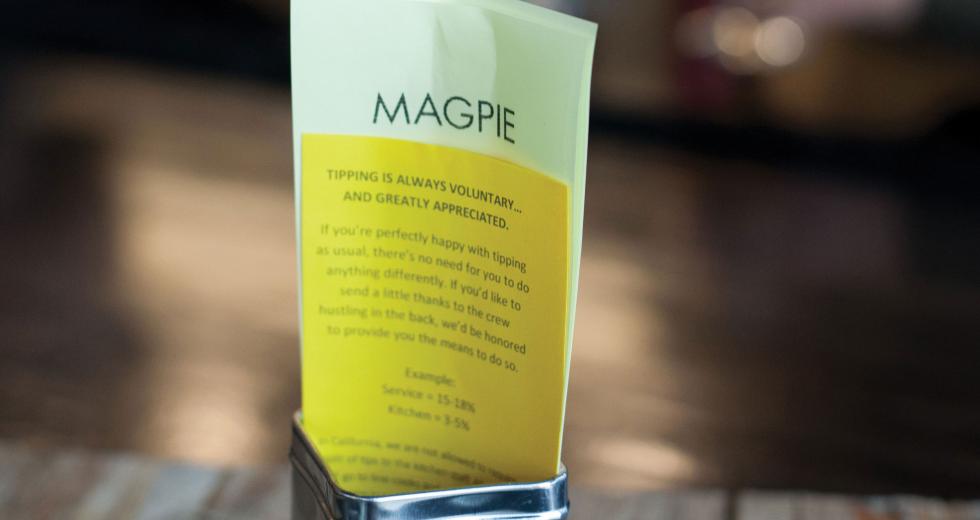Last summer, Magpie Café in midtown Sacramento added a line on their customers’ checks. It gave them the option to tip the cooks separately from the servers. It gave diners what they universally say they want: more control.
Reactions ranged from confused to semi-rebellious. Many customers didn’t know who on staff receives tips (California law says they belong to the serving crew), some disliked the option, many simply didn’t like change. Eventually, things settled down.
“People were nice about it,” says Ed Roehr, who co-owns Magpie with Janel Inouye. “Lots of people were supportive, but they didn’t want to do the math. And lots just didn’t want us to mess with tipping.”
The Magpie experience is a snapshot of what we know about tipping, which is much less than you’d expect, considering the decades of research and the simple fact it is everywhere in the food and service world.
In short, in the U.S., tipping is one hugely illogical, psychologically volatile, wildly inconsistent emotional reflex. The motives for tipping vary, and many make no economic sense.
“The reason for tipping is still out there somewhere,” said Michael McCall, the director of the School of Hospitality Business at Michigan State University.
Matthew Kramer, daytime chef, Magpie Café

McCall has researched tipping extensively and says the reasons for the practice often seem contradictory, starting with the fact that tip amounts only vaguely connect to the quality of service.
McCall’s research shows we tip either because we feel guilty about someone serving us or to establish dominance. Or, we may tip because we think the server needs the cash, we’re in a good mood, or because we’re hoping for good service next time. Perhaps we have a pre-existing relationship with our server, but as McCall says, we may also tip a barista we’ll never see again on a drive down Interstate 5. We may tip to flirt or fit in. Sometimes, it is simply a cry that says, “Please like me.”
“And there’s this weird thing called the service paradox,” McCall says. “If [servers] screw something up, then fix it, customers feel more satisfied.”
But all studies consistently find that, no matter what we tell ourselves, service is just a small factor — and then it’s mostly when it’s horrible or great.
Cornell University Professor Michael Lynn, one of the country’s leading tip researchers, found tip percentages, “are only weakly related to their average service quality.” In a story published by the Cornell Hospitality Quarterly, he reported when customers rated the service good or bad, the difference in the tip was still less than 2 percent. His study included 2,645 dining parties in 21 restaurants.
Related: Tipping Made Easy
Many area servers say these conclusions ring true. Elisabeth-Rose Mandalou, a sommelier and bartender at Ella Dining Room & Bar in downtown Sacramento, says, “Some days make no sense. Sometimes people just make up their minds not to tip much. Other days, people don’t get the service they deserve and they still leave an astronomical tip.”
McCall agrees. “People are going to tip what they’re going to tip,” he says, adding that this is also true for service jobs outside restaurants, such as those in hotels, hair salons or valets. Another reason for tipping is that it gives some customers a feeling of security and even control, according to Steven J. Holland, an economics professor at Luther College in Iowa. In an article on service in the Journal of Socio-Economics, Holland says that too many customers, restaurant dining is an uncertain undertaking. They believe that “tipping can reduce their exposure to risk,” he writes.
This may be an illusion, however. Customers may believe they can inspire good service through tipping, Lynn writes in a comprehensive 2015 Journal of Economic Psychology article, but it isn’t always true. “The observed effects of tipping on service tend to be small.”
But according to McCall, the illusion remains strong. “People fear they’ll get bad service if they don’t tip, or if they can’t tip,” he says.
That explains the generally cranky reactions when major restaurants in San Francisco, Seattle and, most recently, celebrity chef Danny Meyer’s 14 New York restaurants announced they no longer accept tips. Food writers, customers, even wine critics called them everything from un-American to barbaric.
“Customers really like the right to tip,” McCall says.
But why? In his Journal of Economic Psychology article, Lynn writes that economists regard tipping as “irrational” or “mysterious,” because it doesn’t fit the obvious economic goal of paying the lowest price. The reasons, then, are both emotional and individual.
Researchers agree on a few factors that affect tips — beyond the bedrock theorem that often we just tip what we’re going to tip:
The more personal the experience feels, often the better the tip. Techniques that can increase tips include servers saying their customers names, squatting to eye level with diners, engaging in some (but not too much) small talk, touching customers discreetly and lightly, and calling regulars by name. All of this comes with a caveat, Mandalou says. “You can be too nice,” she says. “Some people want their distance.”
“Customers really like the right to tip.” Michael McCall, director, School of Hospitality Business at Michigan State University
Being attractive helps — no surprise. Lynn has shown that blonde servers with large breasts often earn the best tips.
The larger the bill, the smaller the tip percentage, say researchers from Washington University in St. Louis. Their solution: Servers should encourage separate checks.
“Plus there’s something odd we call equity restoration,” McCall says. “Customers think, ‘These people aren’t earning much. They’re serving me. I want to make our relationship fair.’ Just as strange is the idea of reciprocity. We think we shouldn’t get things for free. So if we get a free appetizer, or even a piece of candy, we feel obligated to give something back.”
All of that comes back to an emotional point. We often tip to make ourselves feel connected to the people serving us. That explains why research shows regular customers tip better.
“We see that a lot,” says Suzanne Ricci, co-owner (with her husband, Aimal Formoli) of Formoli’s Bistro in East Sacramento. “A lot of regulars have become our friends, and they want to help out our servers. I tell them, ‘You don’t have to do that,’ but they’re invested in everyone’s success here.”
Plus there’s a new — and peculiar — development. Being a cool, knowledgeable diner can be a goal, even subconsciously, as foodie-hipness pervades the cultural zeitgeist. Tipping well, Ricci says, is cool.
“There’s a lot of insecurity that goes with dining for some people,” she says. “They want to fit in.”
McCall says that it boils down to this: Tipping is barely economic, and if we’re buying anything, it’s a sense of self worth.
“We can’t get away from the point that we do things to make ourselves feel good,” McCall says. “We want people to like us, which is why I want the barista to see the dollar I put in the tip jar, and we want to do the right thing. I just gave a big tip, and so I walk away feeling good about myself.”



